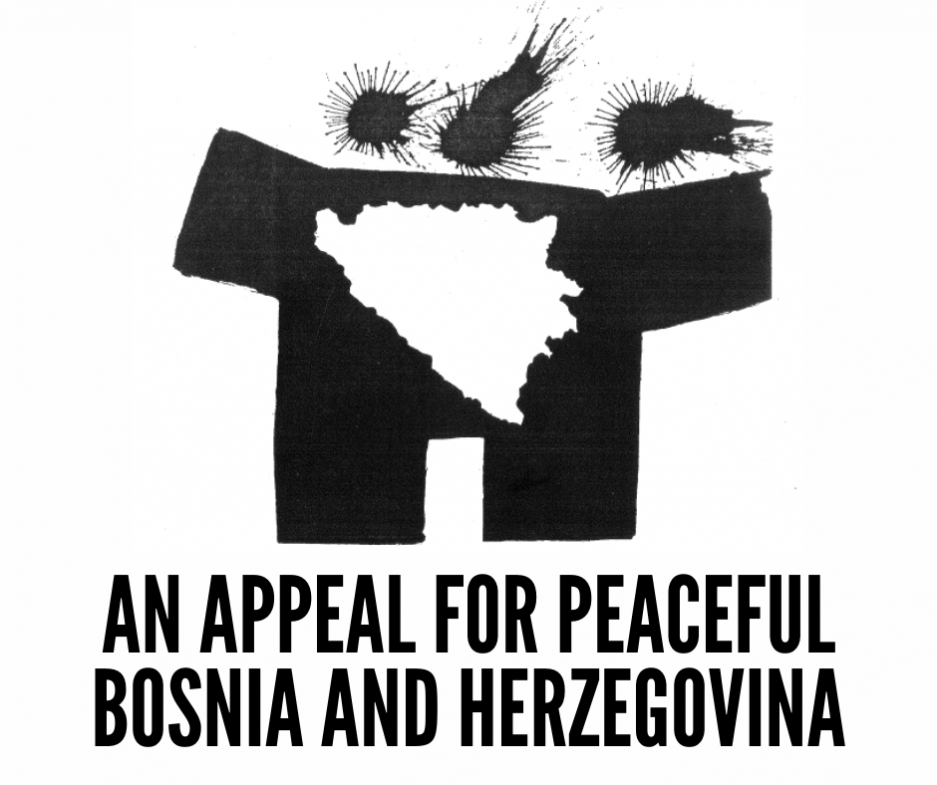AN APPEAL FOR PEACEFUL BOSNIA AND HERZEGOVINA

On the occasion of the thirtieth anniversary of the beginning of the siege of Sarajevo, we reflect on our responsibility to support peacebuilding in Bosnia and Herzegovina and send an appeal to the public and political actors in the Republic of Croatia.
Bosnia and Herzegovina, our neighboring country with which we share more than a thousand kilometers of land border, was attacked more than thirty years ago. It was invaded, but also attacked from within. In the bloodiest of the wars that followed the break-up of Yugoslavia, more than 105,000 people died, according to the Research and Documentation Center in Sarajevo. In other words, a population comparable to the number of inhabitants of the city of Rijeka was killed or disappeared during the war.
Regardless of all the troubles, being a neighbor of BiH has a number of beautiful, human and positive connotations, but for us (at least one) negative. And that connotation is not small, on the contrary it is huge. Our state, its policy, has reached for the territory of neighboring BiH, for its sovereignty. Crimes prosecuted by international and domestic courts were committed during that intervention, but we have not yet dealt with them.
Croatia has taken care of about a million refugees from BiH and supported its defense, which is not disputable and has been said many times. We are left with the darker side, acknowledging the facts about non-Croat camps and other war crimes, for which Tihomir Blaškić, Dario Kordić, Mladen Naletilić, Jadranko Prlić, Ivica Rajić and others were convicted in the proceedings before the International Criminal Tribunal for the former Yugoslavia. Through the policy of collective ‘identity’, but also through the actions of the state in which we live, all of us, the citizens of Croatia, were involved in the endeavor to dismember Bosnia and Herzegovina during the Croat-Bosniak war, which was presented as an action that they are doing on our behalf.
We have never apologized to the citizens of Bosnia and Herzegovina for that, that is what awaits us. We have not yet unreservedly, without a fig sign in our pocket, stood behind the security and sovereignty of our nearest neighbor, that is what awaits us. We have not yet harnessed all our resources and the advantage of EU membership for the benefit of the state of BiH, all its citizens, that is also what awaits us.
For years, friends from Bosnia and Herzegovina have been warning us that the constitutional arrangements provided by the Dayton Peace Agreement needs to be changed because they have become an obstacle to building trust and peace. For a long time, they have been asking for a much stronger European Union engagement. But more than a decade after Dervo Sejdić and Jakob Finci won a lawsuit against Bosnia and Herzegovina at the European Court of Human Rights, key issues remain unchanged. They are still unequal. The constitution for which they sued their country continues to discriminate them, preventing Sejdić as a member of the Roma minority and Finci as member of the Jewish minority, as well as all others who do not belong to the “constituent peoples”, from running for the BiH Presidency and the House of Peoples of the Parliamentary Assembly.
Our neighbors need the support of the whole world to change the Constitution and build peace, because overcoming the consequences of war, especially crimes such as the Srebrenica genocide, is not possible without international cooperation, based on acknowledging the suffering of all victims.
We’re tired of waiting. In the days when the attack of the Russian Federation on independent Ukraine is used to intimidate our neighbors in BiH, it is the perfect moment to correct all our mistakes from the recent past.
We demand from all Croatian institutions to finally, truly stand behind ensuring the prosperity of the whole of BiH, to give up inappropriate interference in the internal affairs of BiH, to be what we all need, a reliable neighbor who links his well-being to the well-being of the neighboring country.
Croatia, as the only EU member bordering a country that suffered so badly in the wars of the 1990s – also through our fault, has that obligation, but also the opportunity.
Center for Peace, Nonviolence and Human Rights Osijek
Center for Peace Studies
CROSOL – Croatian Platform for International Citizen Solidarity
DKolektiv – organization for social development
Documenta – Center for dealing with the past
Youth Initiative for Human Rights
MIRamiDA Center
Croatian Youth Network
Women’s Room
The visual for ARKzin was designed by Veljko Danilović and Miroslav Ambruš Kiš – Mak, and for Documenta it was adapted by Alice Straniero.









